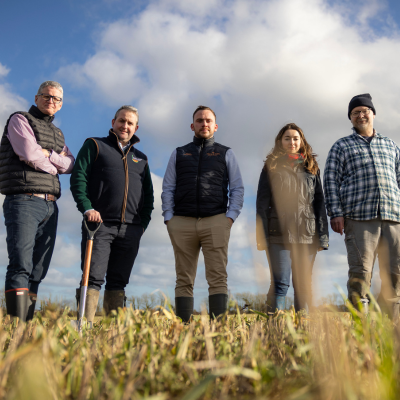
Irish Distillers, producer of some of the world’s most well-known and successful Irish whiskeys, has today announced its 3-year partnership with Ballymaloe Farm and Earthworm Foundation.
This partnership will support the implementation and scale-up of regenerative farming practices for barley, led by the efforts of Darren Allen, owner of Ballymaloe Farm.
Barley cultivated on Ballymaloe Farm will now be grown using regenerative agricultural practices which include minimising soil disturbance, increasing crop diversity and reducing chemical inputs.
When implemented effectively, these measures have the potential to reduce the carbon footprint associated with barely growing and enhance biodiversity on the farm.
As part of the partnership, Ballymaloe Farm will be supported by Earthworm Foundation[1] and Pádraig Shevlin, a leading agronomist in the field of regenerative agriculture. Together they will monitor and assess the impact of the measures adopted and will provide ongoing expert guidance and advice with a tailored action plan for Ballymaloe farm.
A recent report carried out by Earthworm Foundation with the support of Pádraig Shevlin looked at the impact of regenerative agriculture practices implemented at Ballymaloe Farm for the 2024 harvest, establishing a baseline which will be used to measure future progress.
Commenting on the announcement, Graham Caulwell, Head of Sustainability for Irish Distillers, said:
“This marks a proud day for us at Irish Distillers as we announce our regenerative agriculture partnership with Ballymaloe Farm and Earthworm Foundation.
Through this 3-year partnership, we will work with Darren Allen who is a true advocate of regenerative agriculture and its potential to contribute positively to soil health and biodiversity.
A shared objective of this project is to reach a better understanding of the benefits of regenerative farming, underpinned by regular data collection and analysis.
Most importantly, we want to ensure that other grain-growers have the opportunity to see first-hand how regeneratively farmed barley can be rolled-out and scaled up on-farm while maintaining economic viability for the grower.
Together with Earthworm Foundation, we look forward to supporting Darren share his expertise and learnings over the next three years.”
Darren Allen, owner of Ballymaloe Farm said:
“I’ve really enjoy working with the team in Irish Distillers. I’ve found that many of the regenerative practices implemented as part of this project are not only beneficial for the health of the soil but are also economically advantageous.
On my farm, I have witnessed first-hand the positive impact these practices are having on biodiversity, both below and above the ground.
I take much enjoyment from seeing bird life thrive on the regeneratively farmed area and witnessing the explosion in worm life under the ground. I’m looking forward to continuing to work with Irish Distillers on this project and sharing our learnings with other farmers who are interested in the transition towards regenerative agriculture.”
Reflecting on the project, Clara Labaste, Field Coordinator at Earthworm Foundation, commented:
“We believe that healthy soils are at the heart of thriving communities and ecosystems. Rooted in our core values, this project is a collaborative effort with Irish Distillers and Ballymaloe Farm. Together, we are taking concrete steps towards adopting agricultural methods that restore rather than extract using real data and hands-on expertise to drive meaningful change.
These regenerative practices are not only beneficial for the health and biodiversity of the soil, they can also positively impact communities on the ground. We are thrilled to see the results of our collaboration on the grounds of Darren Allen’s farm and hope to see these practices adopted by other farmers.”
Padraig Shevlin from Plant & Soil Solutions Ltd added:
"It is great to be involved in such a wonderful project with the team at Ballymaloe Farm, Irish Distillers and Earthworm which focuses on the soil and how we can improve its health, functionality and ecosystems".
